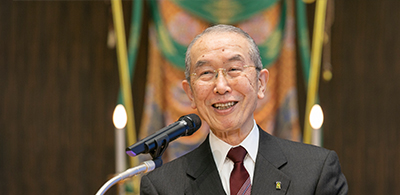Becoming a Person of Complete Harmony
April 2018

With a Single Greeting
In a certain workplace, one employee was very polite about his morning greetings. He looked squarely at his coworkers and, while saying, “Good morning,” slowly bowed his head. It is a small thing, but some coworkers were said to find his overly polite behavior to be a nuisance in the midst of a hectic morning.
After a while, however, the workplace environment started to change. Even the people who until then had simply said “Hi” as they passed by each other started to turn squarely to each other and exchange greetings and gradually, the air in the workplace became calmer.
Being in complete harmony indicates the quality of a personality that is “fully contented and without shortcomings or faults.” Therefore, when we talk about becoming a such a person, we mean something akin to an ideal human being which is, for Buddhists, a person just like the Buddha. However, I do not think that this ideal is some distant goal.
If we suppose that the working of the Buddhas and the bodhisattvas gives people peace of mind and satisfaction, causing them to feel they want to get along with others as well as bring harmony to their environment, then the person who, with a single morning greeting, moves people’s minds and brings harmony to the workplace is none other than a person of complete harmony.
While we human beings do have many shortcomings, this could be called proof that we all possess the buddha-nature. In the same way, whenever we experience new encounters, such as at school or in the workplace, we could say that the conclusive factor in making these human relationships harmonious lies in paying reverence to the buddha-nature in others through the exchange of greetings.
People Who Know Sadness
The essence of human nature is the buddha-nature; and there are numerous stories that show us that human nature is naturally perfect and harmonious. In Edo-period Japan, in Yoshino in modern-day Nara Prefecture, there lived a man named Seikuro who was a pious devotee of the Jodo Shin (True Pure Land) sect. (Pious devotees of the Jodo Shin sect like Seikuro are called myokonin, which literally means wonderfully excellent people.) When money was stolen from his house while he was out, Seikuro said, “Anyone who would enter my house to steal must have been in great difficulty. I am glad that there happened to be some money in my house for that person to take.” He went on to say, “I was allowed to be a ‘person who was robbed,’ guided by the Buddha’s compassion. Nothing could make me happier now.”
Another pious devotee, Monodane Kichibei of Osaka, said, “Anyone can rejoice when times are good. But whatever difficulty you may encounter, at the bottom of that difficulty there is the Buddha Dharma.” His remarks inform us that the joy of realizing “the seed of gratitude” that difficulties teach us is itself the highest pleasure and the true value of faith.
There was nothing in these two men’s minds but their gratitude to the Buddha for their lives and their compassion and consideration toward other people. Being well-rounded is the quality of a personality that is totally contented and lacks nothing, and it can be said that this quality represents none other than a warm feeling of satisfaction capable of receiving, with gratitude, whatever may happen.
Incidentally, the aforementioned Seikuro lost his father early on. While living in poverty with his mother, he met his wife but lost her to death when he was only thirty-three years old. Precisely because he thoroughly experienced sadness and suffering, he understood the pain in people’s hearts. And that understanding became the source of his compassion, which may have given rise to the wisdom in him to help other people.
There is a statue of a bodhisattva seated in the half-lotus position, enshrined at the temple Chuguji in Nara, that is famous for its gentle, slight smile. The literary critic Katsuichiro Kamei (1907–66) penned the following description of its smile: “It may be at one with lament that is welling forth from sorrow and sadness.” In other words, deep in the mind of the bodhisattva are intense sufferings and thoughts that words cannot fully describe.
As indicated by the Buddhist phrase “perfection in compassion and wisdom (hi chi enman),” which refers to the ideal nature of a human being, Shakyamuni and, indeed, all of us are considered to have wished to be born in this world in order to fulfill the vow to manifest as much compassion and wisdom as possible.
Back Number



